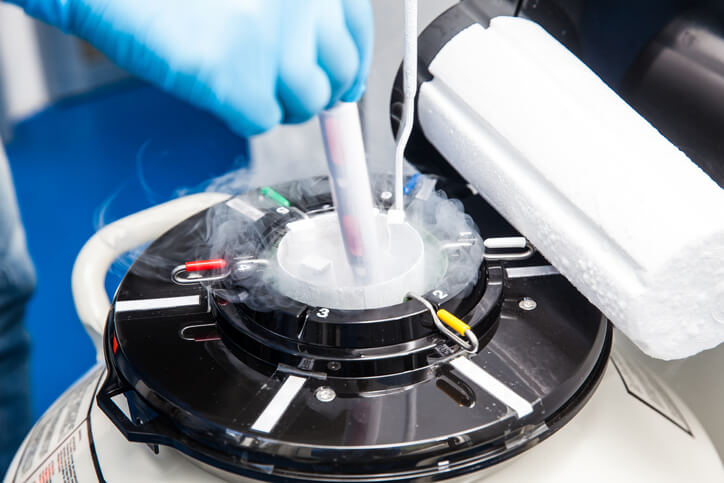Intended parents often have questions about transporting frozen embryos from one fertility clinic to another, especially if those embryos are about to cross the whole country. It’s completely understandable — those embryos are the result of a lot of time, money and hope, so they mean a lot to you.
To help you prepare for your embryos’ journey, here are the answers to five frequently asked questions about shipping embryos:
1. Why Would You Need to Ship Embryos?
Common reasons why you might need to ship your embryos include:
- Switching fertility clinics
- Moving and needing to take them to wherever you’re relocating to
- Sending them to your gestational surrogate’s clinic for her transfer date
2. Does Shipping Embryos Damage Them or Affect Viability?
No. In vitro fertilization is still a relatively new family-building method, so there’s not a lot of data on the success rates of shipped versus not-shipped frozen embryos outside of what’s collected by individual clinics. But, looking at the data that has been collected, there’s no real difference in the success rates between the two.
This is because of how the embryos are frozen, stored and shipped — and the extreme care that’s taken in that process.
Shipping embryos does not hurt them or affect their viability when done correctly, as is consistently the case. It’s common to ship embryos and, if there’s an issue with those embryos, it’s usually because the embryos themselves were low quality or (possible, but less likely) they were damaged in the freezing or thawing process.
3. How are Embryos Stored When Shipped?
The embryos are kept cryogenically frozen during the move with dry vapor liquid nitrogen. They’ll be safe in the packing and can be kept at a consistent temperature for about 10 days.
Some clinics partner with shipping services that ship the embryos in cryogenic storage dewars, high-density foam coolers or other temperature-safe packing material. Whatever shipping service you and your clinic partner with, it will have the necessary containers to protect the embryos and maintain their frozen state. These types of containers are meant to transport medical samples and live tissue, so they’ll work for embryos, as well.
The shipping service may provide the temperature-controlled containers itself, or you may need to pay a deposit, which is refunded when the empty container is returned to the shipping service after the embryos have arrived at the new clinic.
4. How Much Does It Cost to Ship Embryos?
Total shipping cost (within the U.S.) usually falls somewhere around $200 – $500, but this can change based on a number of variables similar to shipping costs with anything else.
Your cost will primarily depend on how far you’re shipping the embryos.
Shipping can be done by ground or air, and it can often happen overnight, depending on how close the two clinics are. Don’t stress about paying extra for overnight shipping as; again, the embryos will be protected in the temperature-controlled storage container. However, how quickly you need the embryos shipped will also significantly affect your cost, just like any delivery service.
Some intended parents choose to drive the embryos (after the clinic has packed them up) from one clinic to the other if the distance isn’t too far. It’s kind of your first road trip with the “kids,” right? This might save you a significant amount of money if your clinic is able to handle this for you, but that option might not be available in every situation.
Other factors that can affect cost are any add-ons you purchase with the shipping service, such as insurance. There will also typically be an equipment rental fee of some sort, regardless of whether the embryos are shipped through a third-party service or the clinic, or you choose to drive them yourself.
You should be able to receive a cost estimate from the company you’re working with for shipping, so check with that professional and request a fee breakdown.
5. How Do You Find an Embryo Shipping Service?
The sending fertility clinic may have a particular cryogenic shipping service with which they partner. If not, your clinic may have a recommendation for a third-party shipping service that specializes in this type of transport, like one of these companies:
- CryoStork (part of CryoPort)
- Core Cryolab
- Princeton CryoTech
However, most clinics don’t work with third-party companies. You might be surprised to learn that the primary (and typically, preferred) mode of transportation for frozen embryos is through FedEx and UPS. Both of those shipping companies frequently work with fertility clinics, hospitals and medical laboratories, and they offer specialty services for transporting cryogenically frozen samples and live tissue. So, you’ll likely work with one of those two primary shipping providers.
If you have any more questions, or you’re worried about transporting your embryos, you can always reach out to your surrogacy specialist at American Surrogacy by calling 1-800-875-BABY(2229).
You can also follow our Instagram to hear directly from intended parents about what they experienced.
